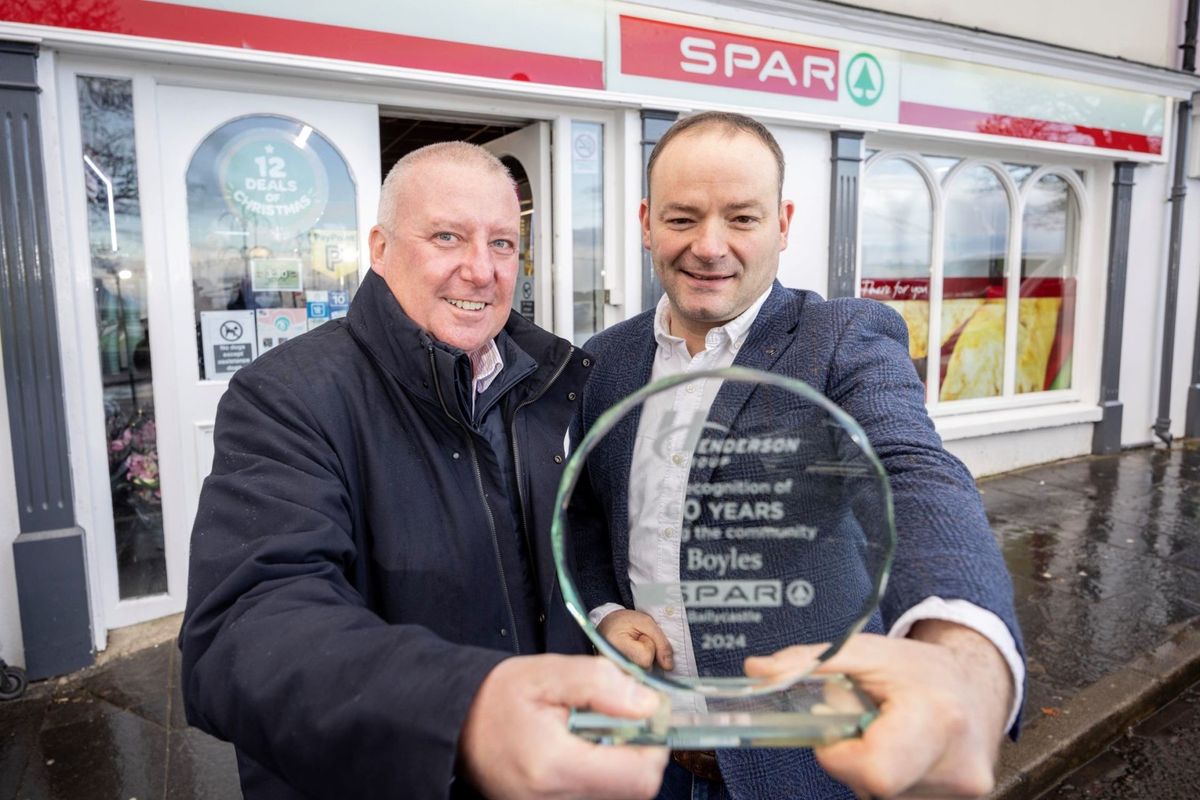Boyle’s SPAR Ballycastle is celebrating 60 years of their community store after investing £100,000 into the business this year.
The recent expansion heavily focused on increasing the store’s fresh food range with their food-to-go and Deli offering both doubling in size, as well as the installation of additional refrigeration, which has allowed the store to increase their range of locally sourced and made in-store fresh products.
The store opened in 1964, trading as Mace until 2004 when they began trading with Henderson Group, under the SPAR brand. Upon opening, the store was owned by Brian Boyle and had just four employees and now employs 35 from the local area. The store remains a family-focused business to this day, as it is now owned and operated by Ronan and Aidan Boyle, who have managed the business since 1999.
Over the years, the Boyle family have made significant investments into the store, totaling over £1 million. Boyles SPAR Ballycastle’s current site was newly built in 2009 when the family made the move from their original site. They then completed a full refit of the store in 2019 totaling £300,000, followed by their latest refurbishment earlier this year.
The Automated External Defibrillator (AED) remains in place after the refurbishment. It’s installed outside the store and available for the community 24/7, providing essential access to potentially lifesaving equipment even when the store is not open to the residential area.
To further celebrate this incredible milestone, store staff embarked on an in-store charity cycle on 7 December, aiming to reach 60 miles for Marie Curie NI. 60p from the sale of every Barista Bar coffee also went towards the charity from 2–8 December as part of the celebration week.
Shoppers were also in with a chance to win a £60 store voucher every day of the week, while also picking up a number of 60p special deals the store were offering to mark the occasion.
“Our local community is central to everything we do and that is why we have made such significant investments over the years to expand our services and product offering for our shoppers,” Ronan Boyle commented. “Our team decided that we wanted our 60th year to be about our community and celebrating with them. We have enjoyed being able to thank our shoppers with competitions and special offers.”
The team has always been community focused, supporting a number of local sports teams including Ballycastle GAA, Carey GAA, Naomh Padraig GAA, Ballycastle Runners AC, Ballycastle Cycling Club and Ballycastle United Football Club, as well as local charities such as Marie Curie. The team at the store has raised £300,000 for these local sports teams, charities and community groups through numerous instore fundraisers and community events over the years.
Aidan Boyle added: “We are passionate about supporting local charities, community groups and sports teams. A number of our team members have strong connections with local sports teams and it is so important to us that we show our commitment to them. Being a hub in the community, we have supported many young people from the local area with employment during their education and it is always a pleasure to help them grow and develop their careers through our store.
“We wish to extend a huge thank you to our team for their loyalty, with a special thank you to Michael McLernon who has worked at the store for 41 years. We would also like to thank our shoppers for their support over the past 60 years and we look forward to many more successful years of the store.”
Paddy Doody, sales and marketing director at Henderson Group which owns the SPAR brand in Northern Ireland, commented: “We wish to congratulate Ronan, Aidan and the whole team at Boyle’s SPAR Ballycastle on their incredible milestone of 60 years. They are such an integral part of their local community, having a positive impact and giving back to local charities and community groups, all while providing value on the doorsteps of their shoppers, and this is what SPAR is all about. We wish them every success for years to come.”


